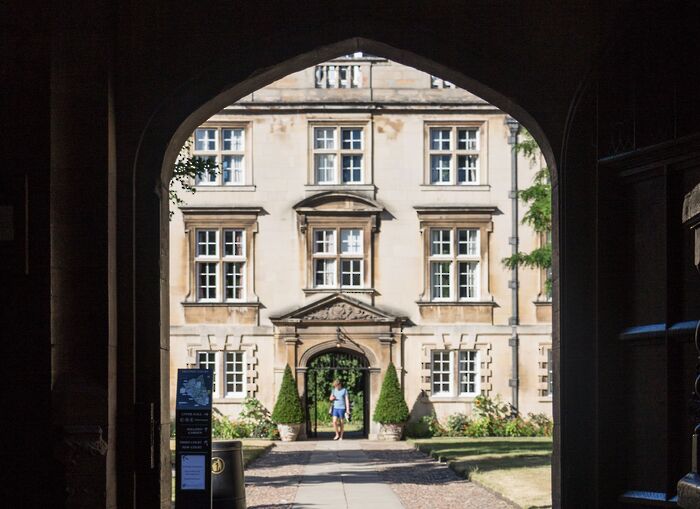Toope second-highest paid vice-chancellor in the UK
Responding to the revelations, CUSU President Evie Aspinall said, “The University must question what its true values are when staff and students are struggling financially while senior officials get huge pay rises”

A newly published report has revealed Cambridge’s Vice-Chancellor to be the second-highest paid head of a university in England.
Data released by the Office for Students (OfS), the government’s higher education regulator, sheds light on the basic salaries of, and total remunerations paid to, heads of such institutions across the country. The OfS was formed in January 2018 and the report compares figures from the 2017-18 period with those from 2016-17.
In 2017-18, Vice-chancellor Stephen Toope earned a basic salary of £431,000, a significant increase from the £343,000 paid the previous year to his predecessor, Leszek Borysiewicz, whose role Toope assumed in October 2017. This increase saw Cambridge jump from eleventh to second place in the rankings of highest paid head, coming in just behind the University of Bath.
Toope’s total remunerations were £492,000, a figure which included £49,000 attributed to the costs of accommodation and utilities, relocation expenses, private healthcare, tax consultancy services and personal flight travel. This figure was also an increase from the previous year’s, which came in at £379,000, and again precipitated a leap up for Cambridge in the rankings highest paid head, moving the University from 20th place in 2016-17, to joint seventh in 2017-18.
Responding to these figures, a University Spokesperson told Varsity: “The Vice-Chancellor of Cambridge University is one of the most significant roles in world academia. The University has an annual income of more than £2 billion, around 16,000 staff and 150 faculties and departments”.
The spokesperson added that the University’s Remuneration Committee set the current Vice-Chancellor’s remuneration package prior to his appointment and “after a detailed analysis of comparable salaries in the UK, North America and Australia.”
The report also outlines pay ratios, showing the relationship between the remuneration of the head of the provider and that of all other employees. This year marked the first time that providers had been required to report this information to the OfS. Toope, the report shows, earned 11.3 times the median basic salary of all other university employees in 2017-18, and received 12.4 times the median remuneration. On this count, universities were ranked according to which institutions paid their heads the greatest amounts compared to the median amount paid to all other employees. Here, Cambridge came in fifth in terms of basic salary and fourth in terms of total remunerations.
In response to the report, CUSU President Evie Aspinall said “The stark disparities in pay across the University are unacceptable and the University must question what its true values are when staff and students are struggling financially while senior officials get huge pay rises.”
This news comes in the wake of the release of the ‘Taylor’s Table’, which ranks Cambridge Colleges based on their wage and employment practices and has drawn attention to the treatment of the university’s lowest paid workers. Aspinall commented that the Table “highlighted how poorly many staff across the Collegiate University are treated” and urged the University to “reassess its priorities.”
On this matter, a University Spokesperson said, “The University is working to improve the pay of its lowest paid staff. In 2018 the University took the decision to become an Accredited Living Wage employer.
“In the Vice-Chancellor’s address to the University in October 2018, he recognized that high living costs are disproportionately felt by those at the lower end of the pay scale, and stated that the University was looking at adopting a minimum rate of payment for University employees that goes beyond the Accredited Living Wage.”
Across England, the report notes, the majority of heads of higher education providers have received an increase in basic salary or total remuneration or both between 2016-17 and 2017-18, with just 13 providers reporting a reduction in the basic salary of their head, and another 18 reporting no increase. The OfS states that there is evidence that “at least some” higher education providers are demonstrating pay restraint.
Where it is a “matter of public interest”, the report concludes, the transparency which the data lends to the issue will “help providers’ remuneration committees and governing bodies to benchmark more effectively. It will also help staff and students push for changes in a provider’s approach to remuneration where it is out of step with stakeholders’ expectations.”
Matt Waddup, head of policy at the University and College Union, was highly critical of the OfS, describing the report as “lightweight” and accusing the regulator of having “shown itself to be a paper tiger incapable of stopping the pay and perks scandals that have plagued universities.”
 News / SU reluctantly registers controversial women’s soc18 December 2025
News / SU reluctantly registers controversial women’s soc18 December 2025 Features / Should I stay or should I go? Cambridge students and alumni reflect on how their memories stay with them15 December 2025
Features / Should I stay or should I go? Cambridge students and alumni reflect on how their memories stay with them15 December 2025 News / Dons warn PM about Vet School closure16 December 2025
News / Dons warn PM about Vet School closure16 December 2025 News / Cambridge study finds students learn better with notes than AI13 December 2025
News / Cambridge study finds students learn better with notes than AI13 December 2025 News / Uni registers controversial new women’s society28 November 2025
News / Uni registers controversial new women’s society28 November 2025










